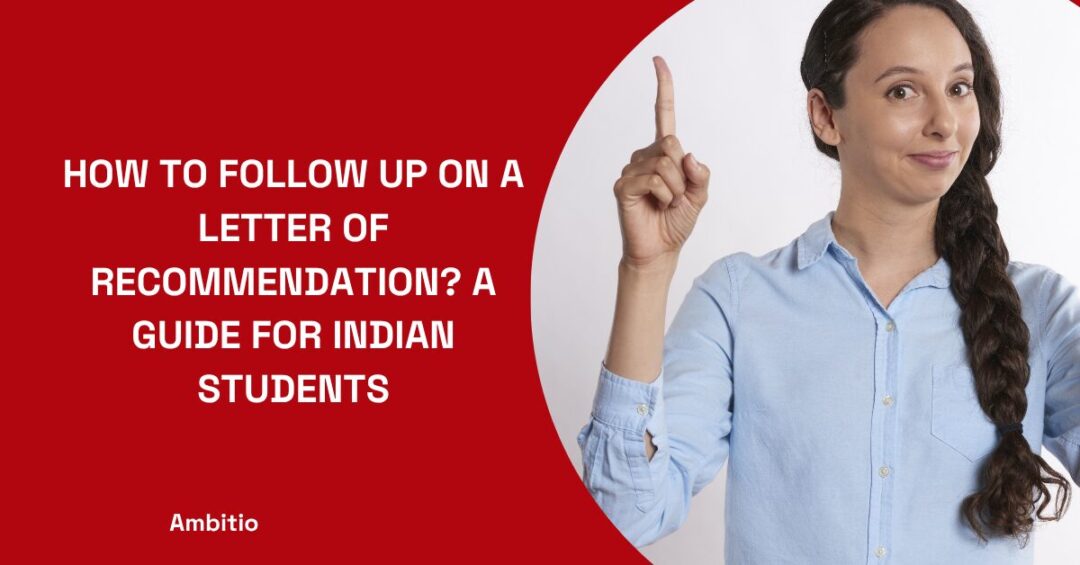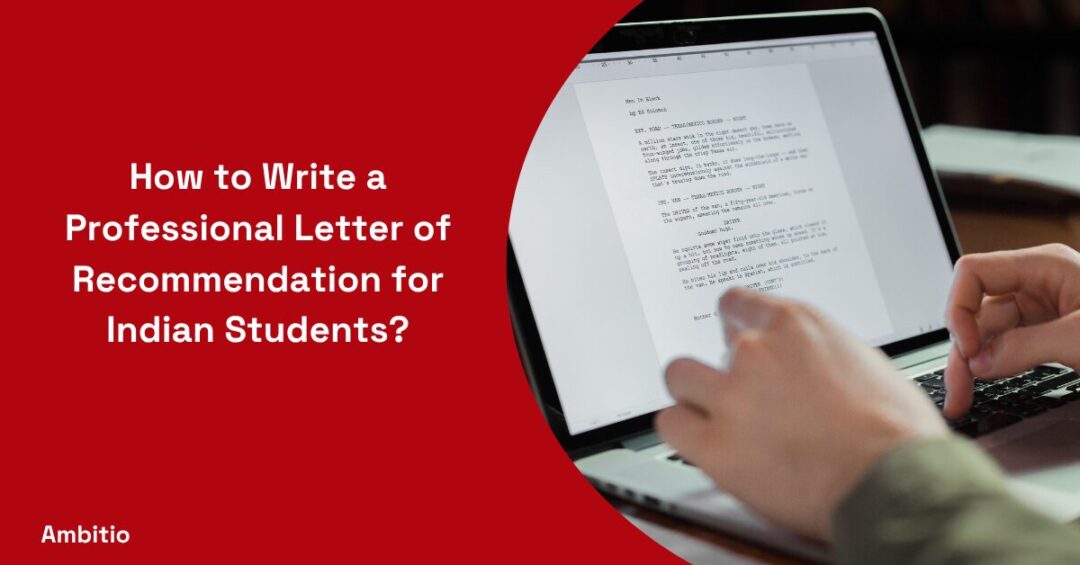17 July 2025
6 minutes read
Should Indian Students Waive Their Right to View Letters of Recommendation?
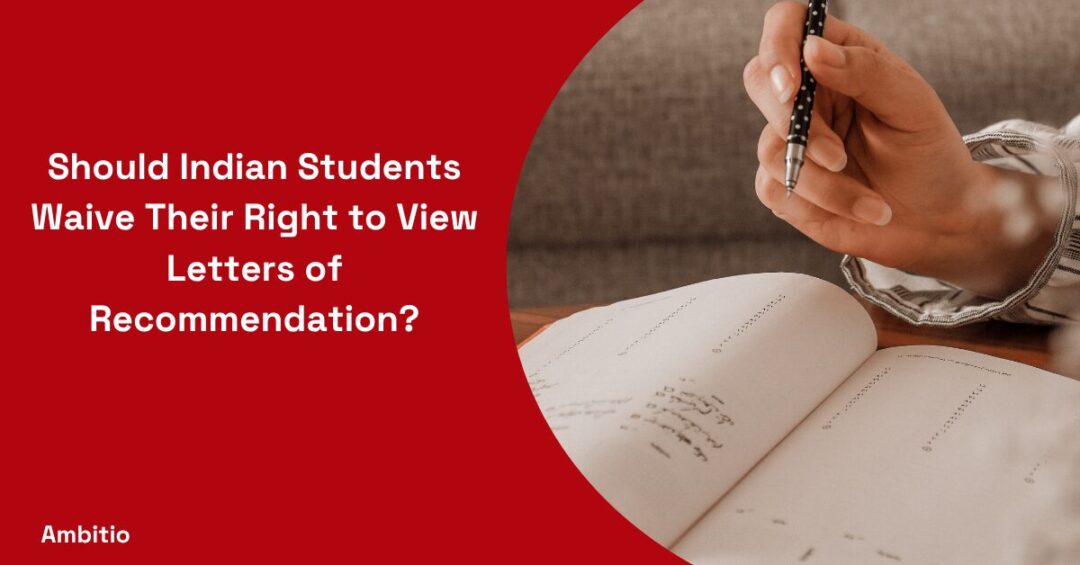
Key Takeaways
- Waive right to view letter of recommendation if you trust your recommender—it adds credibility and signals confidence to admissions officers.
- Don’t waive blindly; discuss the waiver with your recommender if you’re unsure about their support or tone.
- Start early, stay organized, and treat LORs as a strategic part of your study abroad journey, not a last-minute formality.
“Did you waive your right to view the letter of recommendation?” is a question that haunts many Indian students during the college application process. With pressure mounting to secure top-tier admits, most are unaware that ticking ‘yes’ or ‘no’ on the FERPA waiver isn’t just a formality; it’s a trust signal to admissions officers.
If you don’t waive right to view letter of recommendation, your recommender might play it safe, and the credibility of your LOR and your application could quietly take the hit.
What Does It Mean to “Waive Your Right to View a Letter of Recommendation”?
When applying to colleges abroad, especially in the U.S., you’ll be asked whether you waive your right to view letter of recommendation. This question, often overlooked or rushed through on the Common App or MBA programs, ties back to a U.S. law called the Family Educational Rights and Privacy Act (FERPA).
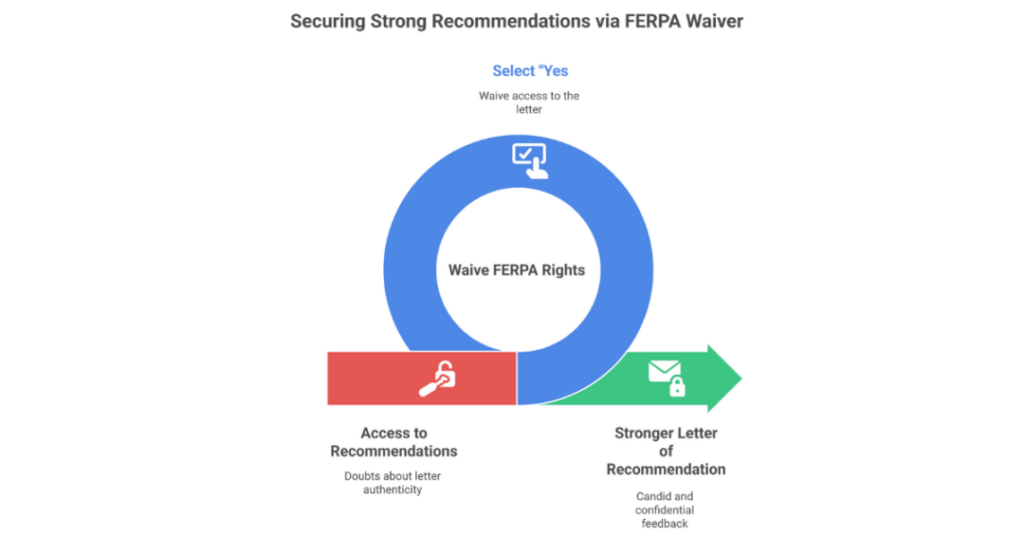
Simply put, it decides whether you can access the letters submitted on your behalf or not. And that one tick box can quietly influence how your recommenders write about you and how admissions officers read your application.
Understanding the FERPA Waiver in US College Applications
FERPA, or the Educational Rights and Privacy Act of 1974, gives students the right to access their educational records, including letters of recommendation.
But during the college application process, you’re asked to waive your FERPA right, meaning you waive your right to access the letter in the future.
If you select “yes,” you won’t be able to see the letter later. This FERPA waiver is meant to protect your recommender and ensure their feedback is candid and confidential.
Why Universities Ask You to Waive This Right
When you waive your right to view or read your recommendations, it sends a signal to admissions officers that you trust your recommender. Most universities believe a recommendation letter written under confidentiality is likely more honest and valuable.
On the other hand, if you retain your right of access, it may raise questions about the authenticity of your LOR, leading to a more generic letter. So, while some students may think, “Why shouldn’t I want to waive my right?” the reality is, recommenders are more likely to write a stronger LOR if they know you won’t access the letter later.
Should Indian Students Waive Their Right?
If you’re applying to grad school from India, you’ve probably stumbled upon the FERPA waiver section and wondered Should I waive my right to view letter of recommendation? It sounds bureaucratic, but it directly impacts how your recommender writes and how college admissions evaluate your application.
Whether you’re applying to business school, submitting a letter of recommendation for Masters in Computer Science, or figuring out how to send letters of recommendation to colleges, this decision isn’t minor—it’s strategic.
The Pros of Waiving Your Right to View LORs
When you waive your right to see the letter, your recommender is more likely to write honestly and confidently. It signals to admissions that the recommendation on the FERPA waiver wasn’t influenced, making the recommendation as more credible.
Most college admissions teams, especially in MBA programs, trust confidential letters more. Plus, since you won’t be able to view or access the letter, it reduces the pressure on your recommender and strengthens the rest of their application.
The Cons of Waiving Your Right — and When You Shouldn’t
Still, the cons of waiving do exist. If you’re unsure about the person you plan to request a letter from, or feel they might not write positively, it’s risky to waive your right to access their records.
Some students want the chance to read what’s said, especially when figuring out how to get letters of recommendation for grad school or reviewing a letter of recommendation for college.
But remember, if you don’t waive your right to inspect or request access to their letters, the writer might write a more generic letter, which could hurt your chances to enroll in a college. Always discuss it with your recommender before deciding, especially when navigating how to ask for a letter of recommendation.
What Admissions Committees Think About waiving the right to access letters of recommendation?
Most admissions officers never meet you in person; your application speaks for you. That’s why your letters of recommendation carry significant weight, especially in MBA recommendation or graduate programs.
When you’re prompted during your college to your Common Application to waive right to view letter of recommendation, it’s not a trick; it’s a subtle cue that universities use to assess trust, transparency, and credibility in what your recommender has written about you.
Does Waiving Add Credibility to Your LOR?
Yes, letters tend to be perceived as more genuine when students waive their right to see or waive my right to read the LOR. When recommenders know you won’t request access or see your letters of recommendation, they often feel freer to be honest and supportive.
This makes your academic letter of recommendation format stronger and more persuasive. In fact, many universities note that FERPA protects both the student and the recommender, encouraging honest evaluations that help you get into college.
How It Affects Your Overall Application
Failing to waive your right to view letter of recommendation can raise a subtle red flag. Admissions committees may wonder if your recommender was constrained or less candid. This can impact how they weigh the rest of your application, especially for competitive programs.
So while it’s your right to request access or even ask, “Does a letter of recommendation need a date?” or “What’s the difference between letter of recommendation and reference letter?”, remember this: a credible, confidential letter matters more than one you’re prompted to read.
Just ensure you plan ahead, know how long in advance to ask for a letter of recommendation, how to politely remind someone about a letter of recommendation, and offer them a solid executive letter of recommendation sample if needed.
Tips for Indian Students Navigating the LOR Process
Getting a strong Letter of Recommendation (LOR) is one of the most overlooked yet critical steps in your study abroad journey. As an Indian student, you might hesitate to approach professors or mentors, worry about how to waive right to view letter of recommendation, or feel unsure about the exact admissions procedures.
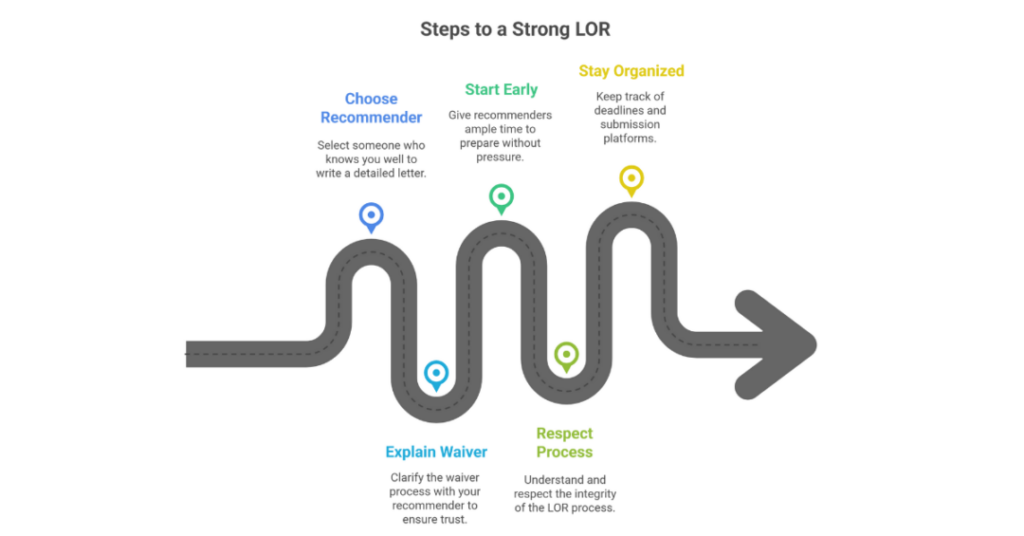
Here are some straightforward tips to help you confidently manage the LOR process without missing important details:
- Choose someone who knows you well: The best person for your LOR is someone who can confidently highlight your strengths. That makes it easier for the recommender to write a detailed and personal letter.
- Explain the waiver clearly: If you’re confused about whether to waive your right to view letter of recommendation, ask your recommender. If you trust them, waiving shows faith in their judgment and boosts credibility.
- Start early and follow up politely: Give your recommenders at least 4–6 weeks’ notice. This gives them time to prepare without pressure. It also respects their schedule and ensures smoother admissions procedures.
- Respect the process: Even though you have the right to see your letters or access to the letter, remember that waiving it helps maintain the letter’s integrity.
- Stay organized: Maintain a list of deadlines and LOR submission platforms. Whether it’s through the Common App or direct uploads, knowing where and how to submit matters just as much as who writes it.
Conclusion
In the end, whether or not you waive right to view letter of recommendation comes down to trust and strategy. But making the right choice is just one part of your larger study abroad journey.
If you’re still unsure about whom to approach, how to frame your profile, or how to build a strong application, Ambitio is here to guide you. We specialize in profile building that actually works, not just templates.
Want personalized LOR strategies, timeline planning, and expert mentorship?
Join Ambitio Elite today and turn your dream admit into reality, one smart move at a time. Let’s build your future together.
FAQs
What does it mean to waive right to view letter of recommendation?
It means you give up your legal right to see the letter your recommender writes.
Should I waive right to view letter of recommendation for my applications?
Many schools expect you to waive right to view letter of recommendation since it signals trust in your recommender.
If I don’t waive right to view letter of recommendation, will it affect my application?
Not waiving right to view letter of recommendation can make your letter seem less credible to admissions committees.
Why do schools ask if I want to waive right to view letter of recommendation?
This is to ensure the letter is honest and candid—waiving right to view letter of recommendation promotes authenticity.
Can I ever see the letter if I waive right to view letter of recommendation?
No, if you waive right to view letter of recommendation, you won’t have access either before or after submission.
Does waiving right to view letter of recommendation affect my relationship with my recommender?
Waiving right to view letter of recommendation shows that you trust your recommender to speak truthfully about you.
How do I indicate if I waive right to view letter of recommendation?
Application platforms provide an option to waive right to view letter of recommendation, typically through a simple checkbox.

You can study at top universities worldwide!
Get expert tips and tricks to get into top universities with a free expert session.
Book Your Free 30-Minute Session Now! Book a call now















